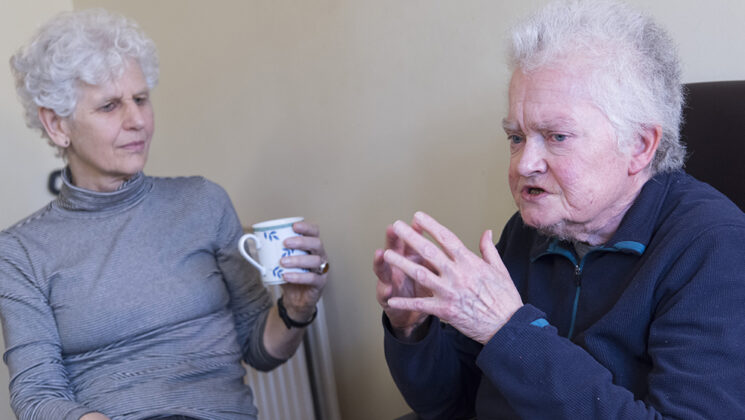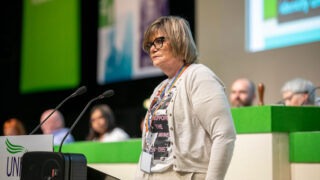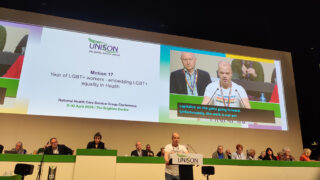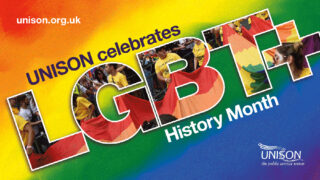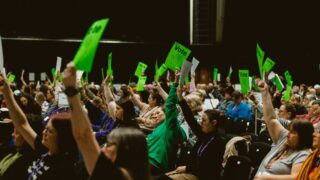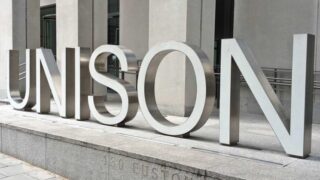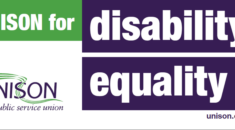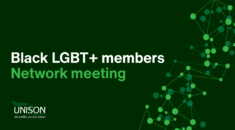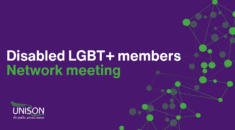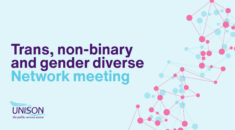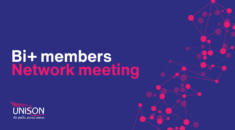Last year, when it was first agreed that 2024 should be designated as UNISON’s Year of LGBT+ Workers, seasoned activist Jackie Lewis (pictured above, right) couldn’t help but feel that it was a case of ‘whose turn it is now?’ But, having listened to what had come out of the union’s Year of Disabled Workers in 2022, she realised the potential such a year can have.
Jackie, described by Dr Julia Ehrt of the International Lesbian, Gay, Bisexual, Trans and Intersex Association (ILGA) as “a living legend”, was presented with the UNISON LGBT+ group’s inaugural lifetime achievement award in 2022. She is joined by former UNISON national LGBT+ and later equalities officer Carola Towle (pictured above, left) to discuss the year and what it means.
These UNISON LGBT+ icons have both spent decades fighting for equality – not just LGBT+ equality – both inside and outside the union.
Why now, this year?
Carola opens by saying: “What always strikes me, is that when Jackie and I first met, there were no laws protecting LGBT people, only laws criminalising them. And that has been, extraordinarily, overturned since. And social change has also happened.
“But it’s still hard to be a young LGBT+ person and an LGBT+ worker. There are still lots of problems in the workplace. And we shouldn’t be surprised. Racism hasn’t gone away, gender pay isn’t equal.”
Life being harder for LGBT+ people is also borne out by the data. It was reported in the Evening Standard last October that, according to the Office for National Statistics, hate crimes on the basis of sexual orientation were up by 112% on the previous five years, with Home Office statistics finding that homophobic hate crimes rose by 41% in 2022 alone. It was, said ILGA-Europe, the “deadliest” rise in violence against LGBT+ people in a decade.
But while such numbers are horrifying, Jackie, who works for Lambeth Council, doesn’t want the year to be focused on such negativity. After those initial doubts, she realised that it could be, first and foremost, a celebration of just what has been achieved in terms of LGBT+ equality.
No laws protecting LGBT+ people
To fully appreciate the achievements, let’s go back in union history. To be precise, to the history of Nalgo, which together with Nupe and Cohse, came together to form UNISON in 1993.
Jackie explains: “When I went to work in local government [and joined Nalgo], I was 22 or something. The situation Carola describes is as it was.
“At the time, there was a bit of a row going on in the union over the race equality working party, which was an all-white working party on how to tackle racism in the union”.
Lesbian and gay activists in Nalgo, predominantly in London, were also starting to organise along those lines, and aware of intersectionality – how some different groups had some things in common such as discrimination – did their best to support Black activists.
Jackie notes that it was extremely radical, at the time, to set up meetings of people to discuss discrimination – and what to do about it.
And then came the 1983 Nalgo national delegate conference in Douglas, on the Isle of Man, where being gay was still a criminal offence.
“So, what we decided we’d do was make a bit of a fuss that Nalgo had organised its conference on the Isle of Man, because men having sex with men was still completely unlawful there.”
Shocking the locals
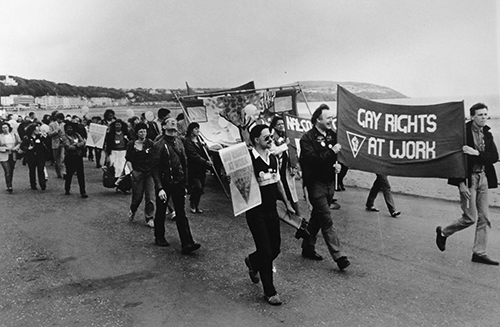
The embryonic lesbian and gay (LG) group organised stunts in the conference centre – balloons, leaflets etc – and then a little march in Douglas. They had asked people to “walk with us” from the conference hall to the island’s parliament, the Tynwald (pictured above). In the event, Jackie says they were astonished that “several hundred came with us. That was quite something in itself!”
Jackie says that her personal favourite memory is of the gobsmacked faces of locals as the march took place. Indeed, reports of the march made the front pages on all the island’s newspapers.
At that juncture, there was only a fledgling LG group in Nalgo. But after the events in Douglas, “we decided we would organise a conference in London”. The only place they could find to host it was a children’s day nursery on a weekend – a situation that saw delegates sitting rather awkwardly on little infant chairs.
The conference was also refused insurance by various companies, including one that said that it would be like “insuring a brothel!”
The group organised a presentation to Nalgo’s national equalities committee, which included asking members to put on a badge saying they were lesbian or gay. It proved deeply uncomfortable for many, but Jackie says this was another way to illustrate to the national union just what the situation was like in reality for lesbians and gay men.
Carola says that, from the earliest days of UNISON, the LG group had a “very clear understanding of intersectionality, so there were always organised groups for Black lesbian and gay members, disabled lesbian and gay members … that were established from day one in UNISON” – not least as a way to avoid tokenism. The group’s name was later changed to LGBT and then LGBT+ at national delegate conferences.
Everyone will know someone who is LGBT+
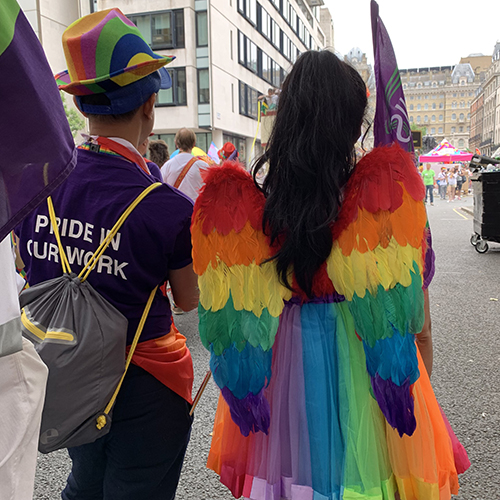
UNISON members at London Pride in 2019
Without considering legal changes such as equal marriage, this history gives an indication of how much has changed for LGBT+ members of the union – but why should non-LGBT+ members care about UNISON’s Year of LGBT+ Workers?
“More or less without exception,” says Carola, “everyone will have someone in their family or their friendship group, if not themselves, for whom this is a very pertinent issue”.
And raising the profile can obviously help awareness – which seems particularly relevant now as we seem to be in the midst of various culture wars. Jackie says that one of the things she sees as important about the Year of LGBT+ Workers is giving an increased opportunity to explain – or remind – everyone “why this is a trade union issue.
“But it’s also a chance for celebrating some of what we’ve actually achieved, reminding people of just how far we’ve come. Even old people, like me! And it’s quite important to pay tribute to the work of those who’ve gone before,” concludes Jackie, “including those who are among UNISON’s retired members now.”
So, UNISON will be busy this year celebrating, remembering, and paying tribute to LGBT+ members and workers and everyone who has supported them. But the union will also be working to ensure that the hard-won rights of the past are not lost in the future.
An awful lot has been achieved, but as is so often the case, the fight continues.
Find out more about LGBT+ members in UNISON at unison.org.uk/out

